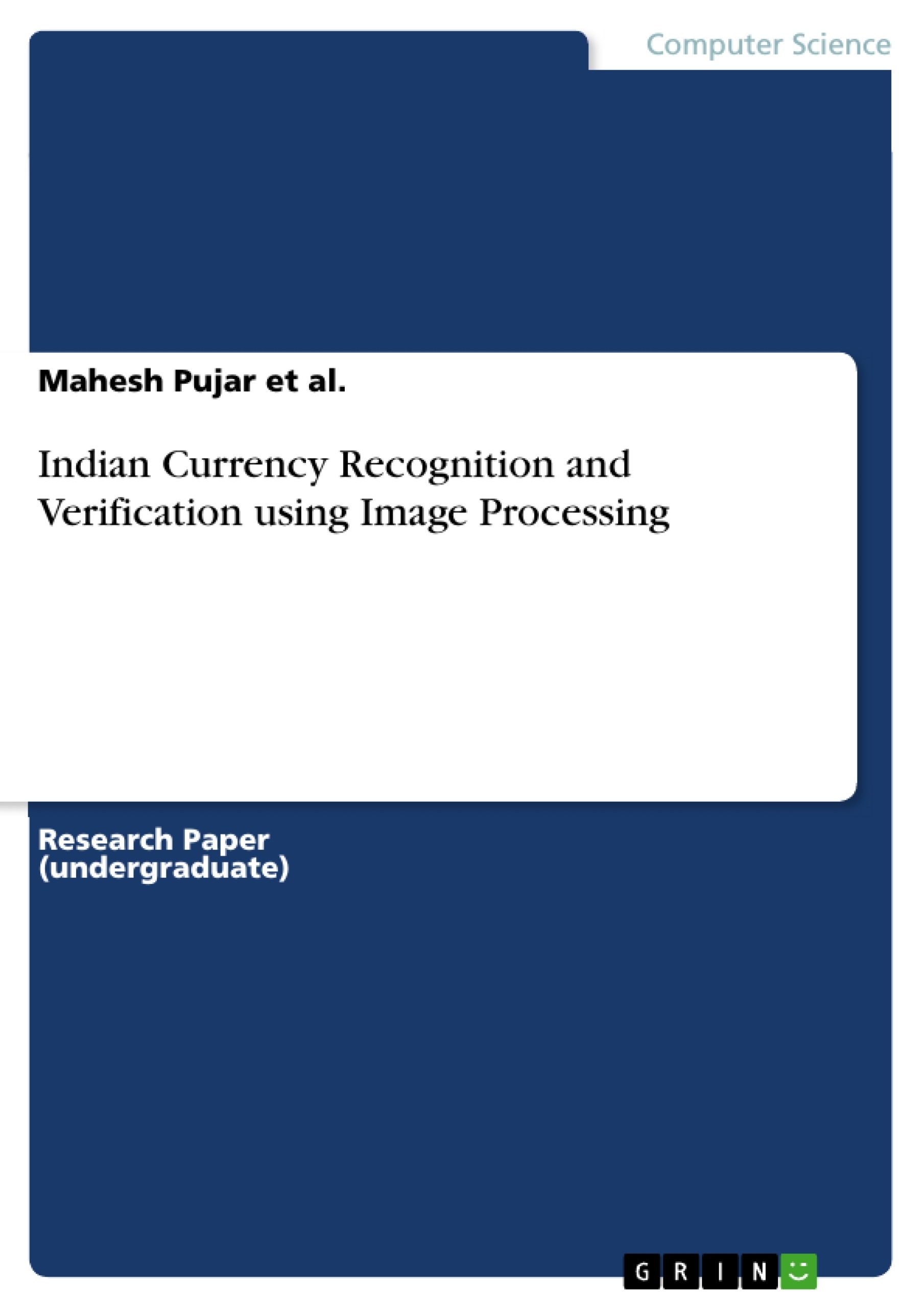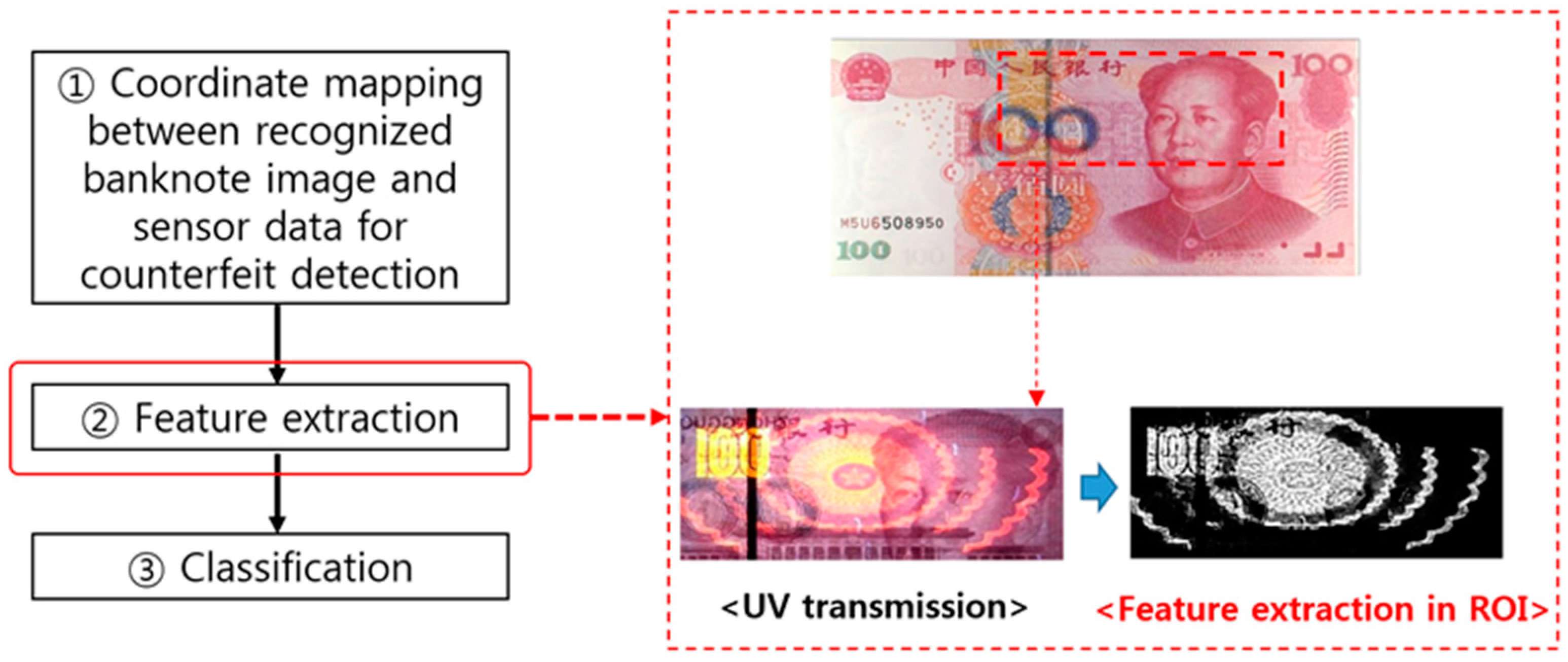Image segmentation is a commonly used technique in digital image processing and analysis to partition an image into multiple parts or regions, often based on the characteristics of the pixels in the image. Image segmentation could involve separating foreground from background, or clustering regions of pixels based on similarities in color or shape. Computer Vision Toolbox™ provides algorithms, functions, and apps for designing and testing computer vision, 3D vision, and video processing systems. You can perform object detection and tracking, as well as feature detection, extraction, and matching. You can automate calibration workflows for single, stereo, and fisheye cameras. Notes 1.In this project setup, note is placed in front of camera to check whether it is fake or genuine. Camera takes the pictures of notes and it is analyzed by MATLAB program installed on computer and checks Indian currency notes. The project is meant to check Indian currency notes of 10, 20, 50, 100, 500 and 1000 rupees.
- Fake Indian Currency Detection Using Camera Matlab Code Free
- Fake Indian Currency Detection Using Camera Matlab Code Pdf
- Fake Indian Currency Detection Using Camera Matlab Code Online
- Fake Indian Currency Detection Using Camera Matlab Code Download
- The following Matlab project contains the source code and Matlab examples used for currency recognition. It is difficult for people to recognize currencies from different countries.This system is based on image processing and makes the process automatic and robust.Color and shape information are used in algorithm.
- This article, recognition of paper currency with the help of digital image processing techniques is described. Around eight characteristics of Indian paper currency is selected for counterfeit detection. The identification marks, optical variable link, see through register and currency color code decides the currency recognition.
Download MATLAB source codes
This MATLAB section of source code covers signal processing, image processing MATLAB source codes.It include FIR, IIR, scrambler, interleaver, FFT, convolution, correlation, interpolation, decimation, CRC, impairments, data type conversions and more.RS encoder, convolutional encoder, viterbi decoder, OFDM, OFDMA, MIMO is also covered. WiMAX, WLAN, LTE source codes are also provided.
Scrambler and Descrambler code
Refer Scrambler descrambler for design of scrambler and descrambler as per IEEE 802.16-2004 wimax standard specifications.
Interleaver and Deinterleaver
Refer Interleaver deinterleaver as per equation defined in wimax standard.
BPSK,QPSK,16QAM and 64QAM Data Mapping
Refer Data Modulation page for BPSK, QPSK, 16QAM and 64QAM modulation matlab source code.
16 Point Decimation in Frequency FFT MATLAB code
Refer 16point IFFT
code very useful for IFFT implementation from scratch very useful for understanding the concept.
Correlation-Auto,Cross
Refer correlation
code very useful for understanding autocorrelation and cross correlation concepts.It also provides comparison with matlab built in functions.
Convolution
Refer convolution
matlab source code and compares the same with matlab built in function.
Interpolation or Up sampling
Refer Interpolation which is used for upsampling digital samples to the desired sampling rate.
Decimation or Down sampling
Refer Decimation which is used for downsampling digital samples to the desired sampling rate.
Convolutional Encoder and Viterbi decoder
Refer Convolutional Encoder and viterbi decoder with the specifications defined.
Generator Polynomials: 25 (8), 33 (8), 37 (8)
no. of memory elements = 4
FIR filter
Refer FIR Filter which covers FIR digital filter matlab source code.It describes FIR filter as per rectangular,Bartlett,Blackman,Chebyshev,Hamming and Hanning window types.
IIR Filter
Refer IIR Filter BUTTERWORTH digital low pass filter.
Low Pass FIR Filter
Refer Low Pass FIR using firrcos function and matlab FDA tool.
CRC8 and CRC32 generation
Refer CRC Generation code as per CRC8 and CRC32 polynomials.
OFDM basic transmitter and receiver
Basic OFDM Transmitter and receiver MATLAB Code➤➤
Reed Solomon Encoder
Refer RS Encoder as per wimax specifications.
Fake Indian Currency Detection Using Camera Matlab Code Free
CTC Encoder matlab source code
Refer CTC Encoder matlab source code.
MIMO STBC 2T1R and 2T2R
Refer MIMO code as per 2x1 and 2x2 STBC MIMO configurations.
WLAN OFDM physical layer
Refer WLAN OFDM PHY page which explains and provide link for OFDM physical layer as per WLAN 802.11a standard.
WiMAX OFDM Physical layer
Refer WiMAX OFDM PHY page which explains and provide link for wimax physical layer blocks and matlab source code.
LTE source codes
Refer LTE simulators page to refer LTE source codes written in MATLAB.
IRIS Edge detection
Refer IRIS Detection matlab code.
OFDMA basic transmitter and receiver
Refer OFDMA Tx Rx code as per OFDMA specifications.
AES and DES encryption and decryption
AES DES
Carrier aggregation concept with OFDM example
Refer carrier aggregation matlab source code with basic block diagram.
CCDF matlab source code

Refer CCDF code useful for plotting CCDF curve in PAPR analysis.
Text based data compression(Huffman,RLE,Arithmetic coding,LZW)

Refer Data Compression code which mention basics of Huffman,RLE,Arithmetic coding,LZW techniques and provide link to download matlab code.
DWT based Image compression
Refer DWT image Compression code which mentionfour basic steps for image compression. It is haar based transform algorithm with threshold detection(soft and hard).It mentions RLE data compression for further reducing the image data.
Edge detection

Refer Edge Detection matlab source code.
PTS Algorithm for PAPR Reduction
Refer PTS Algorithm for PAPR reduction.
OFDM based Preamble generation
Refer preamble generation for OFDM systems such as WLAN,WiMAX and LDACS etc.
Time offset estimation and correction algorithm for OFDM using preamble
Refer Time offset estimationa and correction algorithmfor OFDM system.This preamble is used in LDACS system for aeronautical communication between AS (Aircraft Station) and GS (Ground Station).
Frequency offset estimation and correction for OFDM
Refer Frequency offset estimation and correction algorithm for OFDM system.
CDMA MATLAB code for single user
Refer CDMA MATLAB Code for single user.
OFCDM MATLAB code consisting of OFDM and CDMA chain for single user
Refer OFCDM MATLAB Code housing OFDM and CDMA.The code is simulated for a single user.
SC-FDMA basic transmitter receiver
Refer SC-FDMA matlab simulation code.
PN sequence generation
Refer PN sequence generation basics and matlab code.
Useful Links to MATLAB codes
Refer following as well as links mentioned on left side panel for useful MATLAB codes.
PTS for PAPR reductionOFDM Preamble generationTime off estimation corrFreq off estimation corrchannel estimation11a WLAN channel11g WLAN channelIIR Filter
Low Pass FIR
Viterbi decoder
CRC8 CRC32
AM FM PM modulation
Channel Model MATLAB codes
11a WLAN channel
11g WLAN channel
15.3 UWB channel
15.4a UWB channel
16d SUI Channel
16e wimax channel
Rician channel
Rayleigh channel
RF and Wireless tutorials
Fake Indian Currency Detection Using Camera Matlab Code Pdf
Share this page
Translate this page
Fake Indian Currency Detection Using Camera Matlab Code Online
You can apply machine learning or deep learning techniques with MATLAB® in pattern recognition applications.
Fake Indian Currency Detection Using Camera Matlab Code Download
A machine learning approach consists of preparing your data, manually extracting features to differentiate between classes in the data, and training a machine learning model to classify new objects. Common machine learning techniques or models for object detection include aggregate channel features (ACF), SVM classification using histograms of oriented gradient (HOG) features, and Viola-Jones. These methods are all available in MATLAB®.
A deep learning approach consists of preparing your data and training the deep neural net, and testing the trained model on new data. Common deep learning models used for pattern recognition are R-CNN and YOLO v2, which are also available in MATLAB. In recent years, deep learning approaches have become more popular than machine learning ones.
The main differences between machine learning and deep learning approaches are that deep learning models require a larger training dataset and more training time, whereas machine learning models can be trained with a smaller dataset, may be easier to interpret and debug if not working as expected, but yield lower accuracy than a deep learning model trained on a large set of labelled data.